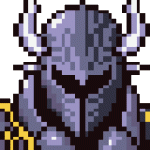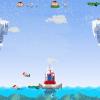Mario Gameplay Analysis Video
Programming is just a tool to implement those ideas.
And it's no different than any other medium. All the tools in the world won't help you if you are creatively bankrupt.
I believe that "thade" is talking in context about aiming the programming talk at the prototype objective instead of beating around the bush. That is how I interpreted it.
Personal life and your private thoughts always effect your career. Research is the intellectual backbone of game development and the first order. Version Control is crucial for full management of applications and software. The better the workflow pipeline, then the greater the potential output for a quality game. Completing projects is the last but finest order.
by Clinton, 3Ddreamer
thade, the entire forum is already programmer talk, and mostly from people who only know how to program and nothing else. When all you have is a hammer, you think every problem is a nail.
Programming is just a tool to implement those ideas.
And it's no different than any other medium. All the tools in the world won't help you if you are creatively bankrupt.
Do you know what the game designers for Fez, Super Meat Boy, and Braid all have in common? They're all accomplished programmers.
The way I see it, a good game designer can very easily get his or her hands dirty; indeed, they're excited to. Painters imagine and picture the thing they want to make, and then they make it. Musicians can hear the sounds they want in their heads, and then they make them. Code is our paint, my friend. Code is our paint.
I'm not saying we want more programming instead of creativity; I'd just as soon have more of both. Perhaps the real issue is that anybody here ever started seeing design and implementation as if they are somehow in opposition. :(
And unfortunately, every creative discipline is overflowing with people who think some minor technicality is their paint, and not their creativity. They flood the market with lifeless crap, never understanding the fundamentals of what they are trying to do.
For people who get it, code isn't the paint, it's the brush. The second they realize that, their potential becomes endless.
Some people never break out of the 'code is the paint' bubble, and never realize their potential. They look at other people's stuff, and see it only as a few technicalities. They think, oh, it's just a sprite or a model that does bla bla bla. So they open up their IDE and that is what they design. And it ends up being crap. At best they have a clunky tech demo. And then they mistakenly think that they can get someone creative to come in at the end and turn it into gold. And that always works about as well as digging up a corpse and giving it CPR. You can't polish a turd.
Technical minded people look at a product like Grand Theft Auto and they think it's just a game where you move an avatar and a world streams in around you and you can shoot things. So they set out to get in on the market share, and they produce exactly that. And we get creatively bankrupt games like Wheelman.
A creatively minded designer looks at Grand Theft Auto and he doesn't see a world streaming engine with an avatar that runs and shoots. Those are irrelevant implementation details. What he sees are the important things that elevate it. GTA is political commentary. GTA is cast of very well designed, memorable characters. GTA is emotion. GTA is a parody of pop culture. GTA missions are a greatest hits list of action scenes from the all time greatest action movies.
So the people who don't get it produce a corpse clone of it. They weren't even creative enough to have a hero with a motivation for being there. He was just a faceless avatar to move around a creatively bankrupt world. And then they tried to give it CPR at the end by throwing Vin Diesel in there, who himself wasn't even creative enough to be anything but Vin Diesel (named Milo).
That's what happens when you confuse the paint with the brush. Fill your bucket with substance first, and then reach for your brush! Otherwise, you are painting with nothing, and fooling no one but yourself.
I think you're taking the semantics a bit too far there; while you have a point about regurgitating ideas, you're missing mine, I fear.
A more thorough understanding of programming is only going to benefit one's skill at game design, much like a more thorough understanding of the color wheel, of types of paint, of mediums, etc. is going to benefit one's skill at painting. Inspiration and creativity are huge parts of it, but of the painting teachers I had - all of which were accomplished professional artists - every single one of them held solid mastery over the tools of their craft. I see game making fitting that same paradigm. You really want to have both technical and non-technical expertise in any art.
Anyway, this is now grossly off-topic, for which I apologize.
Excuse me while I get back to the topic, guys :)
Daltrey - very nice! Good analysis with the spacial axis. There's lots of things I agree with. Some (constructive I hope) criticism:
- the axe throwers aren't the only enemies that attack from more than one side at once, yet only they are the "bad guys" of mario's design you mention - since the same element exists in case of flying turtles and axe throwers and only axe throwers are challenging for you, then maybe this element isn't the reason behind it?
- Extra Credits has been mentioned a few times before and I too think it's a good reference. One thing you can see there is the length of the video. No matter how interesting it is, 16 minutes is a commitment not everyone might want to make. Especially since you get back to the same elements and repeat similar conclusions (like growing and yoshi) that could have been placed together and described in a faster, more efficient way.
- saying things in the end of a video that "there are hundreds of elements that build this game's depth, but we don't have time for that" makes the viewer wanna say "name ten more." And it's not a challenge - sentences like this just never sound good. They sound either ignorant or indicate that the author pretends to know more than he actually does, so why risk leaving this kind of impression?
All in all, I repeat - nice work and nice example how the game design can be analyzed.
Good luck in future videos!










